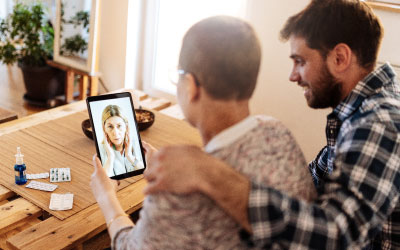Clinical Trial Questions
As you learn more about what clinical trials offer, you may wonder about the details of a specific study. Your cancer doctor or the clinical trial team can help you decide whether to participate.
The webinar video, “Clinical Trials: A Guide for Leukemia Patients and Caregivers,” also addresses factors to think about if you are considering a clinical trial. It is presented by Karen Carlson, MD, PhD, from Medical College of Wisconsin.
Questions to ask the clinical trial team or your doctor
Your doctor might recommend a particular clinical trial to you. Or you might have found a couple of clinical trials through an online search. You should know as much as possible about each study to make an informed decision to participate.
You can ask your doctor or the research team questions about the trial and possible health risks or benefits. Other questions may focus on time commitment, finances, impact on daily life, managing any problems that arise, and next steps after the trial ends.
Questions to ask about the clinical trial itself
Some important questions to ask about a clinical trial may include:
- What phase is the clinical trial in? There are four phases of clinical trials. Phase I and II may carry higher risks because they happen earlier in the process.
- What is the main goal of this study? Why is it being done? You should know the question the clinical trial is trying to answer and why you are volunteering yourself and your time.
- Are there any materials or previously published studies about this new treatment? You should learn as much as you can about the treatment you could be receiving. You should read any published preclinical, phase I, or phase II studies and write down questions you might have about these former studies. Summaries written in non-medical terms may be easier to understand, if available.
Questions about health risks and benefits
- What are the risks and benefits of this treatment? You should be aware of any treatment risks or side effects if they are known. You should also know exactly what the treatment does in the body and any expected short- or long-term benefits.
- What side effects might happen because of the new treatment? How do these side effects compare to current treatment side effects? The answer will depend on the clinical trial phase. Phase I and II trials are trying to answer this question. By phase III, researchers usually know more about side effects. Preclinical studies may report side effects in animals, but what happens in animals may differ from humans. If other people have received the treatment before you, you might be able to find out what side effects they experienced.
- Can I talk to other patients in the clinical trial? You might be able to question current trial participants about their experiences taking part in the research study.
Questions about time commitment
- How long will the clinical trial last? This answer gives you an idea of the time commitment you are making. Will the trial last weeks, months, or years?
- How much time do I have to decide to join? Clinical trials may have recruitment periods, which are limited windows of opportunity to volunteer to participate. There may be a cut-off date when the researchers stop recruiting participants.
- Where is the clinical trial taking place? Do I need to set aside extra time to travel? You can search by location when you’re looking for clinical trials. But if one isn’t available near your home, you’ll need to decide whether you’re able to travel to participate. You’ll need to consider travel time and method, temporary accommodations, and whether you can take time off from work. You may also ask if the trial offers any financial support for participants who need to travel.
- How often do I need to go in for tests or treatment? You should receive a detailed schedule with a timeline for each data collection and treatment session. You may only need testing right before starting the treatment and at the end of the study to see if the treatment worked. Some studies require routine check-ins at specific times during the study. Every trial is different, so learning what to expect helps you to plan accordingly.
Questions about finances
- Who is funding the study? Universities, government organizations, private investors, charities, pharmaceutical companies, and research institutions may fund clinical trials. Ask if the study sponsor covers any of the costs for treatment or required procedures.
- Will I stay in the hospital for any part of the trial? If so, how long is the stay, and will my insurance cover it? Some clinical trials may require procedures that need to be done in a hospital setting. Check to see if the hospital is in-network with your insurance company so your insurance covers the cost of your hospital stay.
- Will I receive payment for my participation in the trial? Some clinical trials may pay volunteers for their time and/or reimburse them for trial-related expenses not covered by insurance or a sponsor.
Questions about how the trial will impact daily life
You should know what to expect during the clinical trial. Some questions to ask may include the following:
- Will I have to stop my regular medications during the study? Some medications may interfere with the new treatment, so you may have to stop them during the study. Sometimes, you can continue taking your regular medications along with the new treatment.
- Will I be able to work during the trial? The answer depends on what you do for a living and if the clinical trial is near your home. If you work remotely, it may be easier to continue to work while participating in clinical trials that are further away from home. If you must go into an office, you may need to choose a clinical trial closer to your work. You may decide to take leave under the Family and Medical Leave Act (FMLA) during the clinical trial. This may decrease stress and allow you to focus on your treatment. Contact your employer’s human resource department to learn more about your options.
- Who oversees my care? Will I still see my regular cancer doctor? Will the researchers work with my doctor? You need to know who leads your cancer treatment: your oncologist (cancer doctor) or the clinical trial team. You may still need to see your regular cancer doctor for check-ups during the study.
Questions about potential problems during the trial
- Who should I contact if I experience problems or have questions during the trial? You should know who to contact in case of emergencies or to report side effects during the trial. This phone number (or numbers) should always be on hand.
- Are there reasons why I might be removed from the clinical trial? Can the clinical trial be stopped early? You cannot join the trial if you don’t meet the requirements after a screening exam. You may withdraw (or the researchers may remove you) from the study if you have serious side effects from the new treatment. Clinical trials may end early if many participants experience serious side effects or if there are problems with the clinical trial itself. The trial may also end early if the treatment is working very well. The researchers can move to the next phase more quickly.
- What tests will monitor my safety? Ask about testing that will detect harmful side effects or complications due to the new treatment. Ask how often these tests are done to monitor you.
- What happens if something goes wrong during the study? What treatments or other benefits will I have access to? You will need to know if insurance covers these additional treatments fully or if you will get a reimbursement for additional expenses due to serious side effects from the new treatment. Learn more about patient safety and rights.
Questions about next steps after the trial ends
- If the new treatment is working for me, will I have access to the treatment after the trial is over? If the new treatment reduces your leukemia symptoms during the trial, you need to know if you can continue the treatment after the study is over. There may be an option to purchase the new treatment privately after the trial ends. You may be able to continue the treatment if you extend your participation into the next phase clinical trial. If it takes time for the treatment to become available, you may need to switch to the best available treatment until the new treatment is ready.
- Are long-term check-ups planned after the treatment is over? Some clinical trials require follow-ups for a certain period after the last treatment dose. This follow-up period helps researchers understand how long the new treatment works in the body. It may also answer other questions after the treatment has ended.
- Will I get the study results? Research participants should have access to results of any study in which they took part. There may be a plain language version where the results are described in ways that are easier to understand.
Clinical trial eligibility criteria
Every clinical trial has different eligibility criteria.
Eligibility depends on whether you meet both the inclusion and exclusion criteria. During the screening process, you must match all requirements to join the study (inclusion) without having any barriers preventing participation (exclusion).
Inclusion criteria
Common inclusion criteria may consist of:
- A specific type of leukemia, such as acute lymphoblastic leukemia (ALL) or chronic lymphocytic leukemia (CLL)
- A certain stage of cancer
- A specific age group
- A specific genetic mutation (change) causing your cancer
- Previous treatment history (some clinical trials require trying several different treatments before qualifying for the trial)
Exclusion criteria
Common exclusion criteria may involve:
- Current health conditions that may impact study results
- Medical history (you may not be able to receive the treatment due to history of certain conditions)
- Treatment history (having or not having received certain cancer treatments in the past)
Next steps
After your doctor approves your clinical trial participation, you will need to consider financial and insurance considerations. You should know who is covering the cost of treatment and any required testing and how much is covered. You should also know what you might have to pay out-of-pocket.



